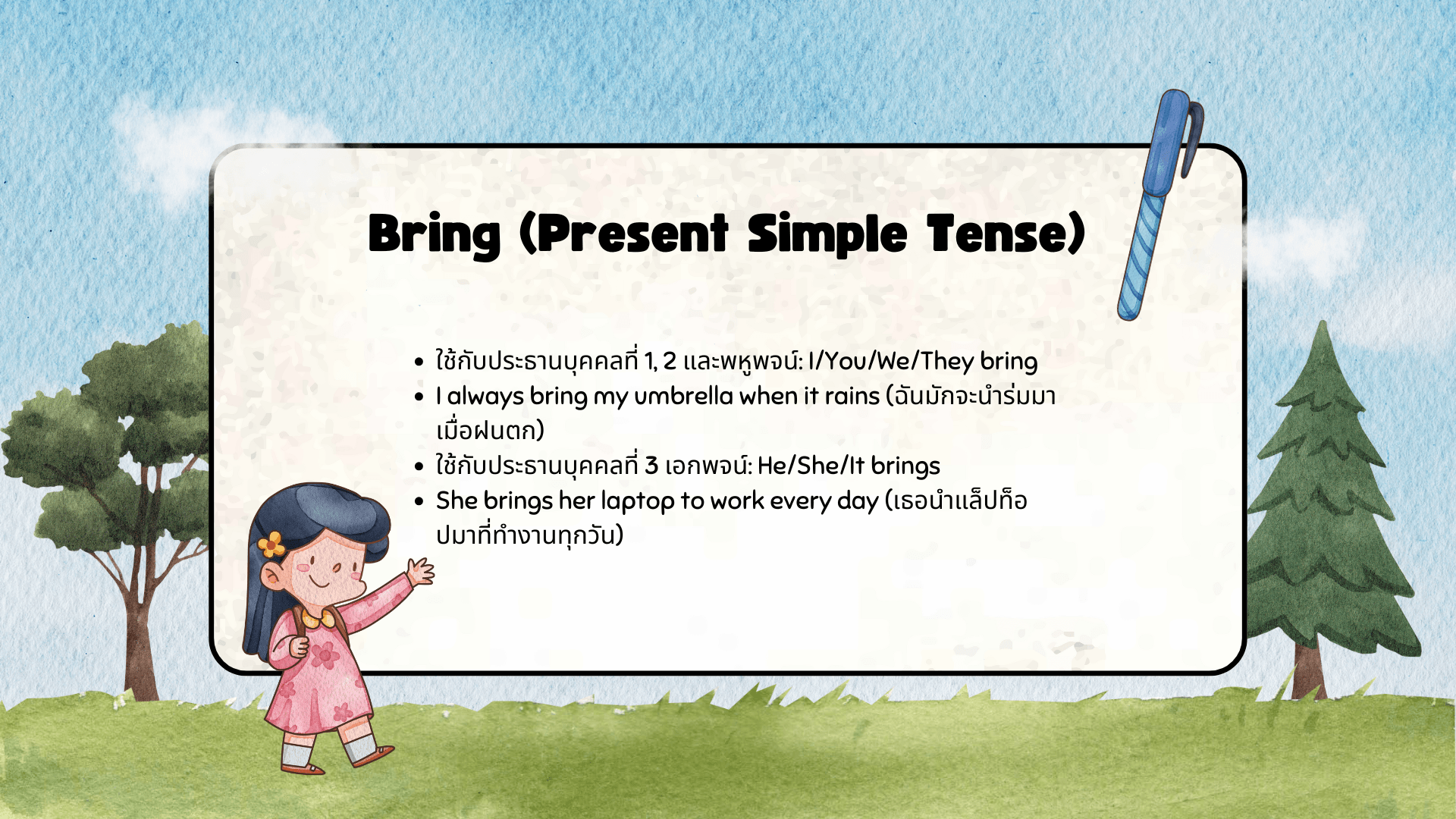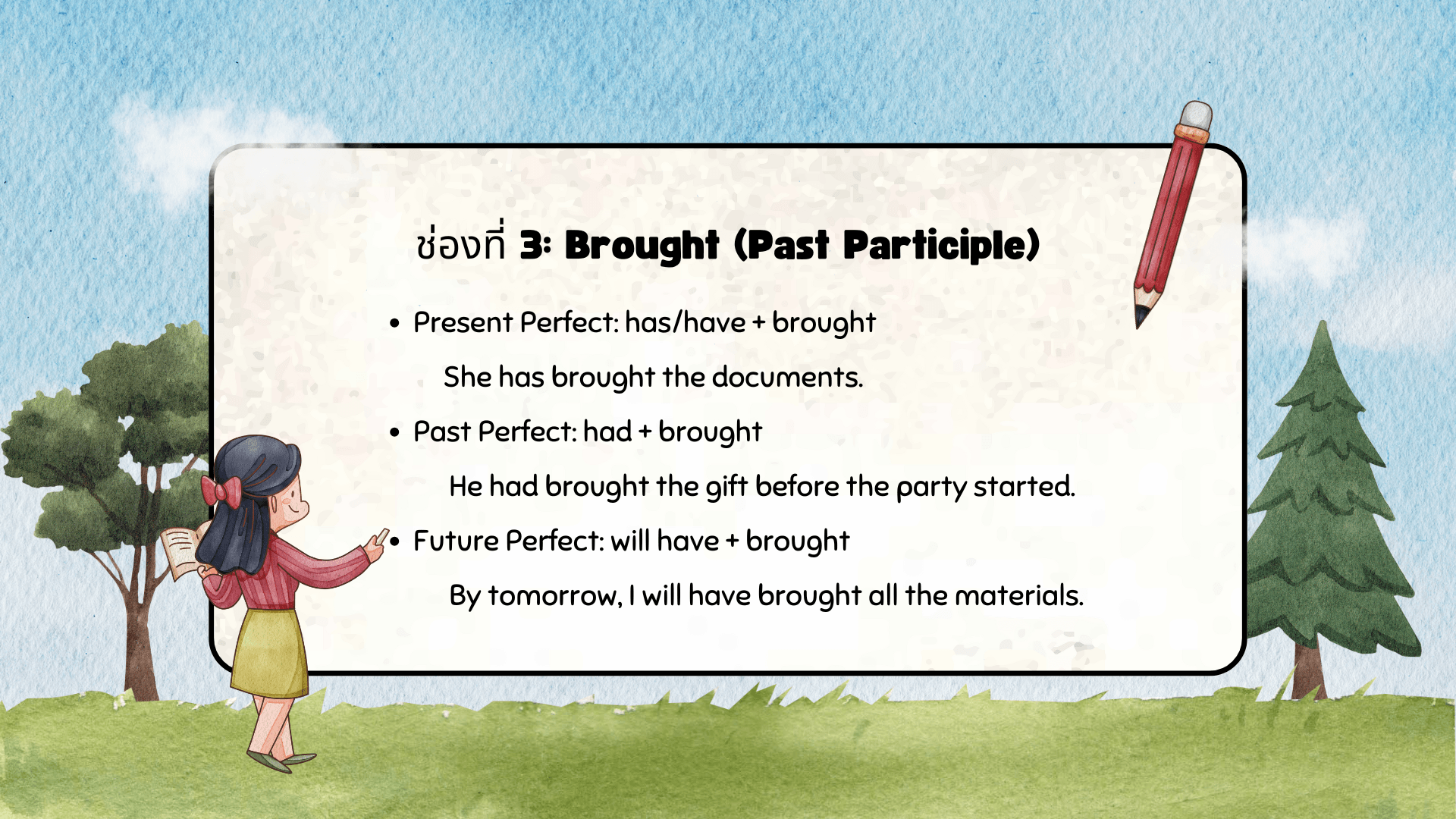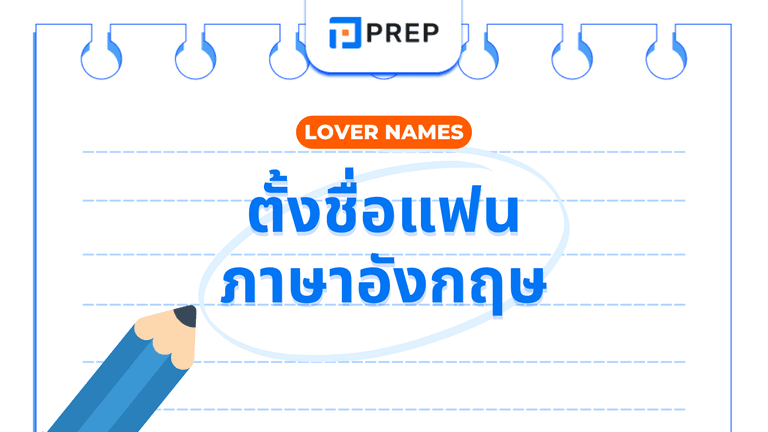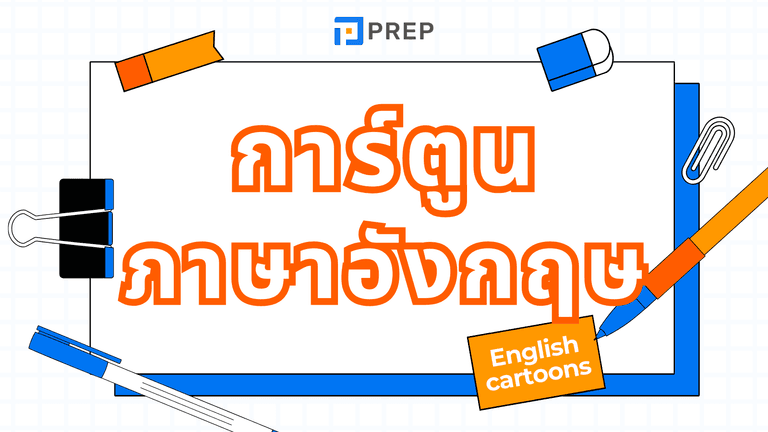กริยา 3 ช่อง Bring พร้อมวิธีใช้และตัวอย่างประโยค
การเรียนรู้ภาษาอังกฤษในยุคดิจิทัลนี้ ผู้เรียนหลายคนมักพบปัญหาการใช้กริยาอปกติที่มีรูปแบบการผันซับซ้อน โดยเฉพาะกริยาที่ใช้บ่อยในชีวิตประจำวันแต่กลับทำให้เกิดความสับสนในการนำไปใช้จริง ซึ่งส่งผลให้การสื่อสารไม่มีประสิทธิภาพและขาดความมั่นใจ
กริยา 3 ช่อง Bring เป็นหนึ่งในกริยาพื้นฐานที่จำเป็นต้องเข้าใจอย่างถ่องแท้ เพื่อการสื่อสารภาษาอังกฤษที่แม่นยำและเป็นธรรมชาติ
การศึกษา bring brought ในแต่ละช่องไม่ใช่เพียงการท่องจำรูปแบบ แต่ต้องเข้าใจหลักการใช้งานในบริบทต่างๆ อย่างลึกซึ้ง Bring ช่อง 2 หรือ verb 2 bring คือ brought ที่ใช้แสดงการกระทำในอดีต ขณะที่ brought แปล ในช่องที่ 3 ใช้กับ Perfect Tenses และ Passive Voice Bring v3 และ bring v3 form มีรูปแบบเดียวกันแต่การใช้งานแตกต่างกันอย่างชัดเจน
ความสำคัญของการเรียนรู้กริยานี้ไม่หยุดอยู่แค่โครงสร้างไวยากรณ์เพียงอย่างเดียว แต่รวมถึงการเข้าใจความแตกต่างระหว่าง bring และ take ในเรื่องทิศทางการเคลื่อนที่ การใช้ bring v 2 ในประโยคต่างๆ และการประยุกต์ใช้ในสำนวนและ phrasal verbs ที่หลากหลาย เช่น bring up, bring about, และ bring back ซึ่งจะช่วยยกระดับการสื่อสารให้มีความหลากหลายและน่าสนใจมากขึ้น
บทความนี้จะนำเสนอเนื้อหาครอบคลุมตั้งแต่พื้นฐานไปจนถึงระดับสูง พร้อมตัวอย่างประโยคที่ใช้ได้จริงและเทคนิคการจำที่มีประสิทธิภาพ เพื่อให้คุณสามารถใช้ กริยา 3 ช่อง Bring ได้อย่างมั่นใจและถูกต้องในทุกสถานการณ์
มาเริ่มต้นการเรียนรู้ที่จะเปลี่ยนความเข้าใจของคุณเกี่ยวกับกริยา Bring ให้ลึกซึ้งและแข็งแกร่งยิ่งขึ้นกัน

I. ตารางสรุปกริยา 3 ช่องของ Bring
|
ช่องที่ |
รูปแบบ |
การใช้งาน |
ตัวอย่าง |
|
ช่องที่ 1 |
Bring |
Present Simple, Infinitive |
I bring my lunch to school. |
|
ช่องที่ 2 |
Brought |
Past Simple |
She brought the documents yesterday. |
|
ช่องที่ 3 |
Brought |
Past Participle |
The package has been brought. |
กริยา bring v2 และ bring v3 มีรูปแบบเดียวกัน ทำให้การจำง่ายขึ้นสำหรับผู้เรียน อย่างไรก็ตาม การใช้งานในแต่ละช่องมีหลักการที่แตกต่างกันอย่างชัดเจน
II. ความหมายหลักของ Bring
คำว่า Bring หมายถึงการนำสิ่งของหรือบุคคลมายังสถานที่ที่ผู้พูดอยู่ กริยานี้เน้นทิศทางการเคลื่อนที่มาหาผู้พูดหรือไปยังจุดหมายที่กำหนด
|
คำศัพท์ |
การออกเสียง (IPA) |
ความหมาย |
ตัวอย่างประโยค |
|
Bring |
/brɪŋ/ |
นำมา, พามา |
Please bring your textbook to class. (กรุณานำหังสือมาที่ห้องเรียน) |
|
Brought |
/brɔːt/ |
นำมาแล้ว (อดีต) |
He brought flowers for his mother. (เขานำดอกไม้มาให้แม่) |
III. เจาะลึกวิธีใช้กริยาแต่ละช่อง พร้อมตัวอย่างประโยค
1. ช่องที่ 1: Bring (Present Simple Tense)
กริยา 3 ช่อง Bring ในช่องแรกใช้แสดงการกระทำในปัจจุบัน ความจริงทั่วไป หรือนิสัยประจำ การผันของ Bring ในปัจจุบันจะเป็น brings เมื่อประธานเป็นบุคคลที่สาม

-
ใช้กับประธานบุคคลที่ 1, 2 และพหูพจน์: I/You/We/They bring
-
ใช้กับประธานบุคคลที่ 3 เอกพจน์: He/She/It brings
ตัวอย่างประโยค:
-
I always bring my umbrella when it rains (ฉันมักจะนำร่มมาเมื่อฝนตก)
-
She brings her laptop to work every day (เธอนำแล็ปท็อปมาที่ทำงานทุกวัน)
-
The delivery man brings packages to our office (คนส่งของนำพัสดุมาที่สำนักงานเรา)
2. ช่องที่ 2: Brought (Past Simple Tense)
Bring ช่อง 2 หรือverb 2 bring คือ brought ใช้แสดงการกระทำที่เกิดขึ้นและจบลงในอดีต Brought แปลว่า "นำมาแล้ว" หรือ "พามาแล้ว" ในอดีต
การใช้งาน brought มีความชัดเจนในการระบุเวลาที่เหตุการณ์เกิดขึ้น ไม่ว่าประธานจะเป็นเอกพจน์หรือพหูพจน์ รูปแบบยังคงเป็น brought
ตัวอย่างประโยค:
-
Yesterday, I brought my camera to the party (เมื่อวานฉันนำกล้องไปงานปาร์ตี้)
-
The students brought their homework to class (นักเรียนนำการบ้านมาที่ห้องเรียน)
-
My friend brought me a souvenir from Japan (เพื่อนฉันนำของที่ระลึกจากญี่ปุ่นมาให้ฉัน)
3. ช่องที่ 3: Brought (Past Participle)
Bring v3หรือbring v3 form คือ brought เช่นเดียวกับช่องที่ 2 แต่การใช้งานแตกต่างกันอย่างสิ้นเชิง ช่องนี้ใช้กับ Perfect Tenses และ Passive Voice

หลักการใช้ใน Perfect Tenses
|
Tense |
โครงสร้าง |
ตัวอย่าง |
ความหมาย |
|
has/have + brought |
She has brought the documents. (เธอได้นำเอกสารมาแล้ว) |
การกระทำในอดีตที่ส่งผลต่อปัจจุบัน |
|
|
had + brought |
He had brought the gift before the party started. (เขาได้นำของขวัญมาก่อนงานปาร์ตี้เริ่ม) |
การกระทำที่เสร็จสิ้นก่อนเหตุการณ์อื่นในอดีต |
|
|
will have + brought |
By tomorrow, I will have brought all the materials. (พรุ่งนี้ฉันจะได้นำวัสดุทั้งหมดมาแล้ว) |
การกระทำที่จะเสร็จสิ้นในอนาคต |
หลักการใช้ใน Passive Voice
Passive Voice ช่วยเน้นไปที่สิ่งที่ถูกกระทำมากกว่าผู้กระทำ Bring v 2 ในรูป Passive จะกลายเป็น "was/were brought" ส่วน brought แปลในรูป Passive หมายถึง "ถูกนำมา"
ตัวอย่างประโยค:
-
The food was brought by the catering service (อาหารถูกนำมาโดยบริการจัดเลี้ยง)
-
All documents have been brought to the meeting room (เอกสารทั้งหมดถูกนำมาที่ห้องประชุมแล้ว)
-
The equipment will be brought tomorrow morning (อุปกรณ์จะถูกนำมาในเช้าวันพรุ่งนี้)
IV. ข้อควรระวังและข้อผิดพลาดที่พบบ่อยในการใช้ Bring-Brought-Brought
ผู้เรียนมักเกิดความสับสนในการใช้กริยา 3 ช่อง Bringโดยเฉพาะการแยกแยะระหว่าง bring brought ในช่องที่ 2 และ 3 ข้อผิดพลาดที่พบบ่อย ได้แก่:
-
การใช้ "brang" แทน "brought" ซึ่งไม่ถูกต้อง
-
การสับสนระหว่าง bring กับ take ในด้านทิศทาง
-
การลืมผัน brings ในประธานบุคคลที่สาม
วิธีการหลีกเลี่ยงข้อผิดพลาดคือการฝึกฝนการใช้งานอย่างสม่ำเสมอและจำรูปแบบที่ถูกต้อง ควรระลึกเสมอว่า brought ใช้ได้ทั้งใน Past Simple และ Past Participle
V. การใช้ Phrasal Verbs Bring
Phrasal Verbs กับ Bring ที่พบบ่อยที่สุด:
1. Bring up
Phrasal verb นี้มีความหมายหลัก 2 ประการ คือ "เลี้ยงดู" และ "หยิบยกประเด็น" การใช้งานขึ้นอยู่กับบริบทของประโยค
ตัวอย่าง:
-
My grandmother brought me up after my parents died. (ย่าเลี้ยงดูฉันหลังจากพ่อแม่เสียชีวิต)
-
Please don't bring up that topic during dinner. (กรุณาอย่าหยิบยกเรื่องนั้นขณะทานอาหาร)
2. Bring about
หมายถึง "ก่อให้เกิด" หรือ "นำมาซึ่ง" มักใช้กับการเปลี่ยนแปลงหรือผลลัพธ์ที่เกิดขึ้น
ตัวอย่าง:
-
Technology has brought about many changes in our lives. (เทคโนโลยีได้ก่อให้เกิดการเปลี่ยนแปลงมากมายในชีวิตเรา)
3. Bring back
ความหมายคือ "นำกลับมา" หรือ "ทำให้นึกถึง" ใช้ได้ทั้งในความหมายที่เป็นรูปธรรมและนามธรรม
ตัวอย่าง:
-
This song brings back memories of my childhood. (เพลงนี้ทำให้นึกถึงความทรงจำวัยเด็ก)
กริยา 3 ช่อง Bring สามารถใช้ในความหมายเชิงนามธรรมได้หลากหลาย เช่น "bring happiness" (นำความสุขมาให้) หรือ "bring success" (นำความสำเร็จมาให้) การใช้งานเหล่านี้ช่วยให้ภาษาอังกฤษของคุณฟังดูธรรมชาติและประณีตมากขึ้น
นอกจากนี้ brought ยังสามารถใช้ในโครงสร้าง causative ได้ เช่น "What brought you here?" (อะไรทำให้คุณมาที่นี่?) ซึ่งแสดงถึงสาเหตุหรือเหตุผลที่ทำให้เกิดการกระทำ
บทความแนะนำอ่านต่อ:
VI. คำถามที่พบบ่อย (FAQs) และข้อสงสัยเชิงลึก
1. คำว่า 'Brought' เป็นได้ทั้งกริยาช่องที่ 2 และ 3 ใช่หรือไม่?
ใช่ครับ brought เป็นได้ทั้ง Past Simple (ช่องที่ 2) และ Past Participle (ช่องที่ 3) ของกริยา bring การแยกแยะใช้ดูจากโครงสร้างประโยคและ context ที่ใช้งาน
2. นอกจาก 'Bring' มีคำกริยาอปกติตัวไหนอีกบ้างที่ผันเสียงคล้ายกัน?
กริยาที่มีรูปแบบการผันคล้ายกันมี buy-bought-bought, think-thought-thought, และ catch-caught-caught ซึ่งล้วนมีเสียง -ought หรือ -aught
3. 'Bring' และ 'Take' มีความแตกต่างในนัยยะอื่นอีกหรือไม่?
นอกจากทิศทางแล้ว bring มักใช้ในบริบทที่เป็นมิตรและต้อนรับ ขณะที่ take อาจใช้ในบริบทที่เน้นการควบคุมหรือการยึดครอง
4. เราสามารถใช้ 'Bring' ในความหมายเชิงนามธรรมได้อย่างไรบ้าง?
Bring ใช้ได้กับแนวคิดนามธรรม เช่น bring peace (นำสันติภาพมาให้), bring change (นำการเปลี่ยนแปลงมาให้), หรือ bring luck (นำโชคมาให้)
การเรียนรู้กริยา 3 ช่อง Bringให้เชี่ยวชาญต้องอาศัยการฝึกฝนอย่างสม่ำเสมอ จำไว้ว่า bring-brought-brought มีรูปแบบเดียวกันในช่องที่ 2 และ 3 ทำให้การจำง่ายขึ้น
เคล็ดลับสำคัญในการใช้ bring คือการมองทิศทางการเคลื่อนที่ หากสิ่งของเคลื่อนที่มาหาคุณให้ใช้ bring หากเคลื่อนที่ไปจากคุณให้ใช้ take การฝึกใช้ phrasal verbs กับ bring จะช่วยเพิ่มความหลากหลายในการสื่อสาร
สุดท้าย ควรใช้ brought และ bring v3 ในบริบทที่เหมาะสม โดยเฉพาะใน Perfect Tenses และ Passive Voice เพื่อให้การสื่อสารมีความแม่นยำและประณีตมากยิ่งขึ้น
PREP – แพลตฟอร์มเรียน & ฝึกสอบอัจฉริยะที่ใช้ AI ช่วยให้คุณเรียนรู้ไวยากรณ์และคำศัพท์ภาษาอังกฤษได้อย่างง่ายดาย ด้วยวิธีการ Context-based Learning, Task-based Learning และ Guided Discovery ที่ทำให้การเรียนรู้เข้าใจง่ายและน่าสนใจยิ่งขึ้น
การเตรียมตัวสอบ IELTS ที่มีประสิทธิภาพต้องอาศัยแผนการเรียนรู้ที่เป็นระบบและการฝึกฝนอย่างต่อเนื่อง หากคุณต้องการยกระดับทักษะภาษาอังกฤษและบรรลุเป้าหมายคะแนนที่ตั้งไว้ การเรียน IELTS กับ PREP จะช่วยให้คุณเข้าถึงหลักสูตรที่ออกแบบมาเป็นพิเศษตามระดับความสามารถ ด้วยระบบการเรียนการสอนที่ผสมผสานเทคโนโลยี AI
ดาวน์โหลดแอป PREP วันนี้ เพื่อเริ่มเรียนภาษาอังกฤษออนไลน์จากที่บ้าน
ติดต่อ HOTLINE +6624606789 หรือคลิกที่นี่เพื่อสมัครเรียนทันที!

สวัสดีค่ะ ฉันชื่อมุก ปัจจุบันดูแลด้านเนื้อหาผลิตภัณฑ์ของ Prep Education ค่ะ
ด้วยประสบการณ์มากกว่า 5 ปีในการเรียน IELTS ออนไลน์ด้วยตนเอง ฉันเข้าใจดีถึงความท้าทายที่ผู้เรียนต้องเผชิญ แล้วก็รู้ว่าอะไรที่มันเวิร์ก
มุกอยากเอาประสบการณ์ตรงนี้มาช่วยแชร์ แล้วก็ซัพพอร์ตเพื่อน ๆ ให้ได้คะแนนที่ดีที่สุดค่ะ
ความคิดเห็น
เนื้อหาแบบพรีเมียม
ดูทั้งหมดบทความที่เกี่ยวข้อง
แผนการเรียนรู้ส่วนบุคคล
อ่านมากที่สุด
ติดต่อ Prep ผ่านโซเชียล
















